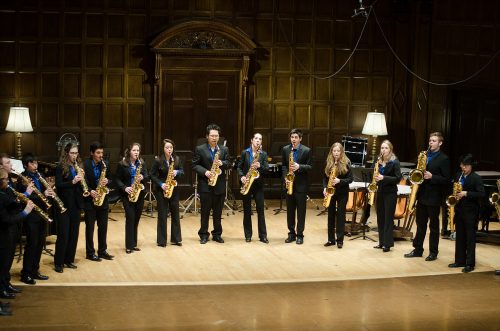The Eastman Saxophone Project (ESP), performing in Kilbourn Hall
by Jarod Lau
Saxophone ensemble performances have long been a highlight of the Summer@Eastman concert calendar for participants and audience members alike (there’s nothing quite like seeing—or hearing—forty saxophonists play “The Pines of the Appian Way” from Respighi’s Pines of Rome). This year, Professor Chien-Kwan Lin decided to create an entire institute focusing on saxophone ensemble, in addition to the classic Eastman Summer Saxophone Institute (which will now be centered mainly on individual lessons and performance). The new Eastman Saxophone Project (ESP) Institute offers exceptional high school and collegiate players a chance to train and perform with members of ESP. Participants will perform ESP music; they may also bring saxophone-ensemble arrangements and get advice during the week. The institutes pair well together; students are welcome to register for both weeks to get a complete look at the Eastman saxophone experience. Here, Professor Lin answers questions about the new program:
Who is your targeted age group/targeted player level? (precollegiate, collegiate, post-college, or all?)
We’re targeting saxophonists from across the country who love playing with others in a fun-loving group. But I expect most participants to be from the advanced high school through collegiate age groups. The saxophone ensemble is a genre that has enjoyed rising popularity in recent years, and the Eastman Saxophone Project (ESP) has played an instrumental role in generating this interest. There are so many wonderful players out there who wish they had an ensemble to play with. The ESPI will provide these folks a platform to get involved in such an ensemble.
Can you give us an overview of the institute?
The overall goal is to let saxophonists experience what it’s like to play in the ESP. We will be working on music from ESP’s repertoire, which involves sectionals and individual coaching. There will also be seminars on arranging for the saxophone ensemble, reading sessions etc. It’s not very different from going to a band camp, except that you get to play a lot more than just being in a saxophone section within a band, and that the music you’ll play is saxophone-centric.
What is your main goal for the students?
My goal for these students is for them to bring back to their individual saxophone communities a renewed enthusiasm and understanding for this genre. They will experience our unique approach to rehearsal techniques, sound concepts, arranging skills, and what makes the ‘ESP sound.’
What are some highlights of this institute?
One of the highlights of the ESPI is to actually be playing with members of the ESP – yes, the same ones you see on YouTube! I will also be directing all rehearsals personally. With this setup, students will get as close as possible to having a complete ESP experience. And here’s something really special – if you’re an avid arranger for your saxophone ensemble, you can get your arrangements read during our reading sessions. You will also be given guidance on your arranging techniques throughout the week, culminating in a recording session at the end of the week to bring home your work. I think that is an invaluable experience for young arrangers.
Describe the typical day: what should participants expect?
Like I said earlier, coming to the ESPI is not unlike going to a typical band camp, which is a well-structured learning experience. You will have full ensemble rehearsals, sectionals, individual lessons, time to practice, and make friends with your fellow saxophone enthusiasts. There will be lectures on the topic on saxophone ensemble, and of course the instrument itself. Oh, and there’s a pizza party too!
Will there be performance opportunities?
Of course! Music is meant to be heard and shared, and ESP always seeks opportunities to present its music with audiences from all walks of life. So the capstone event at the end of the week will be the concert by the entire ESPI ensemble. It’ll be a chance for us to show off the fruits of our weeklong labor. And it’ll also be live-streamed so our friends and family back home can hear us perform.
Any other details you would like to add?
The word that I hear most often from people who have played in a saxophone ensemble is “fun.” Therefore the principle on which I created the ESPI is enrichment through hard work, but always in the spirit of ‘fun’. Making music is fun. It makes us happy. We learn so much better through having fun, and the ESPI promises tons of it.
